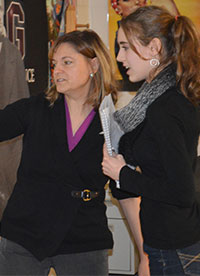The usual pre-class chatter in room 228 at Grandville High School had an unusual edge to it on a recent Wednesday morning. That was because a film crew was busy setting up equipment.
That day’s lesson will have especially far-reaching implications.
A crew from the College Board was in town to observe and record Kyle VanderWall’s Advanced Placement U.S. history class in action. The footage will be used to create a professional development video that will be seen by some 14,000 teachers.
“It was kind of weird, but a really cool experience,” said sophomore Natalie Mateju, who was willing to do as many takes as necessary so her teacher would be recognized for his talents.
“He’s really good, and he makes (U.S. history) really interesting,” Natalie said. “That makes it easy to learn without getting bored, because we know exactly what we need to be doing.”
VanderWall was hired in 2013 by the College Board to be a consultant in AP U.S. history. Along with 100 other teachers, he is responsible for the training of all AP U.S. history teachers across the country.
Last December, VanderWall visited the College Board offices in New York City to share some of the ways he works to develop students’ historical thinking skills. As part of an update to those modules that reflect changes to evaluation tools for AP U.S. History, the College Board decided to visit Grandville to document VanderWall — and his students — in action.
Wednesday’s class had to do with “unpacking” essay questions. Though students hadn’t been primed ahead of time, their responses made it clear that VanderWall’s lessons are sinking in.

A Class That Learns Together
During what their teacher called a “generalizations and analysis drill,” students used highlighters to “mine” an essay question about the New South, displayed on the overhead projector, for its crucial elements.
The drill lived up to its name: It was fast-paced.
“Who can tell me what skill is being assessed in this question?” VanderWall asked.
A hand shot up right away. “”Continuity and change,” answered Brendan Graham.
Matt Kocsis next suggested “evaluating the extent of the change.” Tom Bos thought the question called for “identifying what, specifically changed, and what remained the same over time,” and whether those changes were short- or long-term.
Grace Warsen added that the years in the question — 1865 to 1917 — were significant because they spanned the end of the Civil War to the start of World War I.
Bingo. Now, VanderWall said, they were ready to review the steps that would prepare them to answer the question.
‘Feather in Our Cap’
Grandville High Principal Chris VanderSlice called the College Board taping “a great feather in our cap for them to want to come here.”
“This is one of our most challenging courses,” VanderSlice said. “Kyle does such a great job, and he’s very proud of his students.”









